Heleena, a tattoo artist and owner of Francis Street Tattoo in Leicester specialises in traditional south Asian folky tattoos. A ‘Guji baby’, shes’s been speaking out about the inequalities and discrimination in the tattoo industry, here she talks about cultural appropriation within the tattoo world and why it’s problematic…
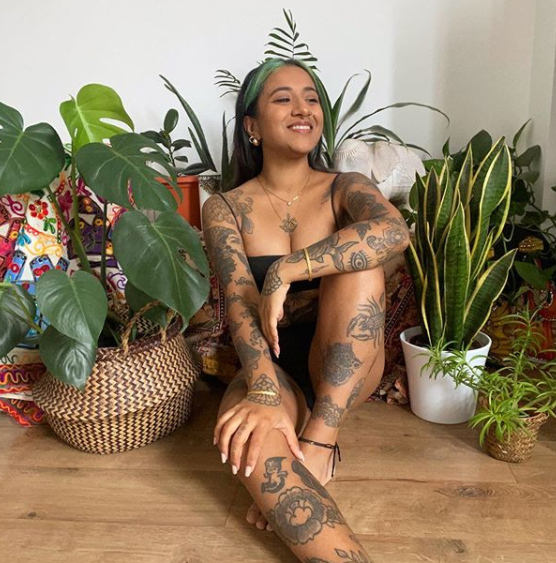
I only found out what cultural appropriation actually meant very, very recently. We all know the term and get the gist – it’s not yours and you’ve taken it, also don’t make money off it if it’s not yours. But, the definition is adopting something from a culture when you belong to a different culture, so it’s the adopting that’s the issue.
I feel like cultural appropriation is such a tough subject to speak about and I feel like a lot of people don’t speak about it. It’s difficult to talk about because it’s hard not to offend anyone, but it’s good to have uncomfortable conversations, it’s important.
In my point of view, I think it’s wrong to profit from someone else’s culture, especially if you’re profiting from something you don’t actually have much knowledge about. Profiting off a culture is bad. I’m not saying you should know everything about Indian culture, I’m not expecting someone to know a lifetime’s worth of culture. But if you’re going to use that art work, you should give back to the community that you’re taking from.
So if you wanted one of my ladies, you’ve come to me, you’re not appropriating. I’ve done it, I’ve designed it for you. You’ve come to a south Asian person to have south Asian art, I don’t think you can appropriate art it if this is the route you’ve taken. It’s like if you go to India and buy a piece of art. You’re giving back to that community, and to a person who has that culture. What would be an issue is if you went to a white artist and say; ‘I’ve found this on Pinterest, it’s so cute, I know nothing about it, please tattoo it on me.’ That’s a big issue. I’m genuinely hurt that people are making money off my culture and don’t understand basic facts about it.
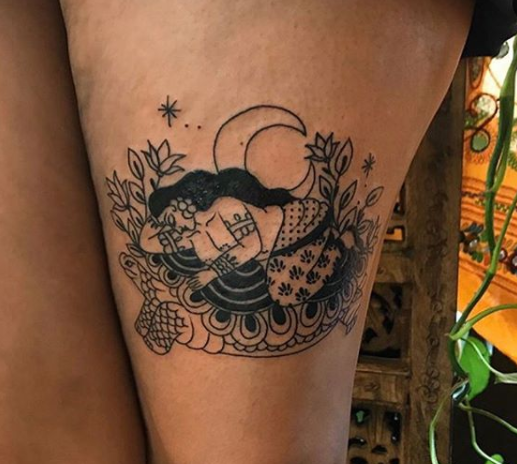
The line between appreciation and appropriation
There’s a very fine line and obviously it’s very hard to tell if someone is on that line without getting to know them or knowing the person who they are. It can be very disrespectful to want something cause it looks cool, rather than knowing about it. I wish more tattooists would question a person before they tattoo something religious on them, for example.
I feel like I might get criticism here, because I do tattoo religious iconography on people that aren’t brown, because Hinduism is more of a spiritual thing – you don’t have to convert to Hinduism, it’s more of a state of mind. So some of my clients and regular clients are white. Many of them get a lot of my work done, and they’ve been to India, they’ve prayed in temples, they’ve done everything to assimilate to the culture that they’re in while they’re in it. And I appreciate that, that is a form of appreciation, you didn’t go there just to take cute pictures and look cultured. You went there to actually learn about the culture and immerse yourself. It’s a huge difference.
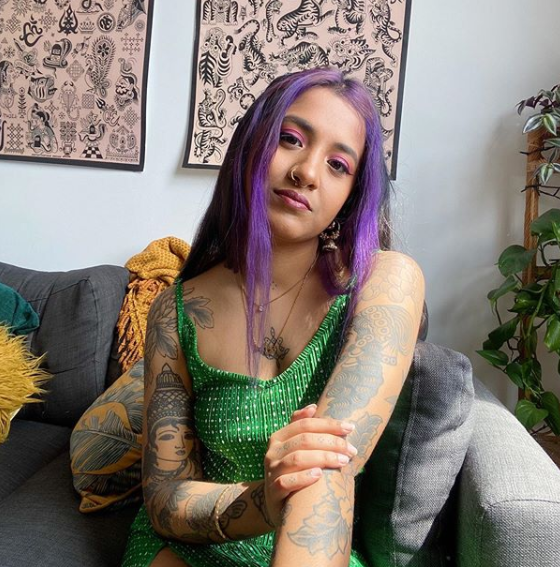
This is the thing with appreciation and appropriation, because someone can seem very much like they’re appreciating. But if you appreciated properly, if you knew enough about something, then you wouldn’t adopt it for yourself. Like the cornrows and Bantu knots of African women – ‘oh I’m appreciating cause I’m wearing this’, but if you really knew the oppression black women have faced about their hair, why would you want to join in with that? It just shows when people adopt things they don’t actually know shit about them.
I don’t claim to know it all, but the things I do know about I’ve learnt through reading – we’ve all got the internet you know! Google it all! What’s that saying? In the age of the internet, ignorance is not an option. I think that’s very true, and I don’t think there’s any reason to be appropriating at this point.
Whitewashed your feed
There’s been an influx of artists that have been trying to compensate for the lack of colour in their posts. It’s really strange did you know that you were doing this? Was this unconscious or did you know and now you’ve been called out for it? Or did you not realise and you’ve come through to own up to your mistakes?
There were a lot of angry people around my post about desaturation and taking the colour out of tattoos, saying things like, “so what we can’t edit our photos, we’re just taking the redness out?” I don’t know if anybody knows this but tattoos get red. I don’t know where the obsession with taking the redness out of pictures has come from. That’s what they look like. Nobody actually knows what they really look like, for some reason when we post a picture of a new tattoo it looks like it’s already healed, there’s no redness or swelling, no blood.
I used the term ‘corpse like’ on Instagram, which somebody didn’t really like, but that’s how it feels when you see someone taking the colour out of your photo – you look cold, you don’t look yourself, it makes you question – why did they do that to me? Why did they take the colour out of my skin? That’s definitely why I think stop erasing our skin tones. There’s no need for it.
It’s nice to see brown bodies, that’s something I wanted to see when I first started getting tattooed. I only came across one Indian/south Asian tattoo artist after a lot of searching. I’m very appreciative that my feed is very brown, it’s orange and warm. I really wish I saw stuff like this when I was 18 and first wanted a tattoo and I wanted to know what it would look like on me. Google Indian/south Asian tattoo artist now and a whole bunch of stuff will come up and I’m a part of it!
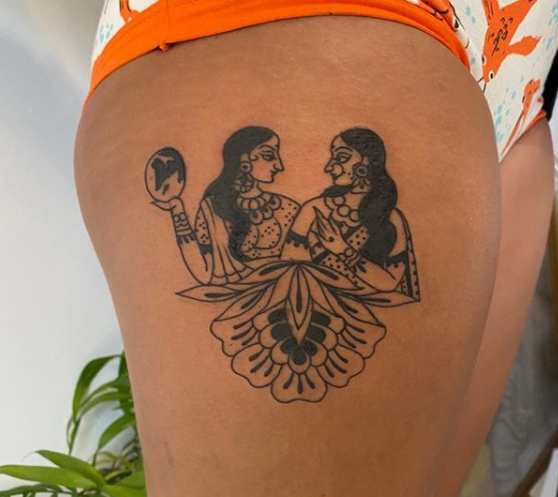
The only brown person in the room
I asked my followers what it felt like to get tattooed as a POC and some of the answers were hard to read. Some of them were really heartbreaking. I asked because I didn’t know if it was a just a me thing, obviously me being a tattoo artist I’m usually in white spaces a lot, having white friends as well. I’m always the minority, it sounds terrible but I always feel uncomfortable, I sit with that discomfort a lot and I don’t say anything. When it comes to finding a tattoo artist, I’m heavily tattooed and like traditional work. Most traditional tattoo artists are white men. Whenever it comes to meeting a new artist, I’ll get scared and I’ll hesitate and think, I don’t want to go to this person in case they’re racist. It’s a genuine fear any time I meet somebody I’m terrified that I’m going to walk in and they’re going to look at me and think, ‘oh shit, she’s brown, I don’t want to tattoo her.’ I fear that they’re going to say something horrible to me and it’s happened before.
Kelly Smith did my back and she’s the loveliest person I’ve met in my life, but before I met her I was thinking, I’m going to be sitting day sessions with this woman, never met her, she could look at me and be like ‘omg she’s brown I can’t tattoo her.’ It’s a genuine thing, are they going to be racist, are they going to like the fact that I’m Indian? It’s like those fears you feel when you meet a new artist for the first time, I’ve never met this person before. Are they going to be a complete dick? We’ve heard all the horror stories of the victims of sexual assault in the tattoo industry, they should never feel that way. Then the added fear of being a POC and a woman, and being in that situation. You’ve got double the fear, are they going to be racist, are they going to sexually harass me? It’s horrible.
Those were the things I was expecting when I asked the question to my followers but the things I heard were far worse. People had paid someone to scar them and then weren’t given the satisfaction of seeing that post on Instagram or if it was posted, the artist had edited away that person’s skin tone. People told me that tattooers had outright refused to tattoo people them or people’s skin had been ruined. It’s horrible, it’s so sad, and it breaks my heart that people have to deal with this. And I’m glad I asked that question because it opened up so many people’s eyes, it opened up my own eyes to the extent of how bad it was – as I haven’t gone through all of it. As a tattoo artist I am privileged as I know my clients will never have to deal with that. I think it was an eye opener for everyone!
It’s when people don’t see it as an issue, obviously I am a POC, I am very aware when I’m the only brown person in the room, but when you’re the majority in the room, you wouldn’t notice. In some sense I don’t blame people for not seeing something that doesn’t affect them, but when people are listening to you and they say, ‘I don’t feel like that, I’ve not noticed that’, you have to continue to say I’m telling you this has happened to me.
Everything I drew was black and white
I’ve told people about the struggle I felt getting into this industry and they were like, well I didn’t do that to you, that’s not me. I’m not telling you that you did it I’m just telling you that’s what happened. When I got my first apprenticeship the artist actually said to me, ‘I hired you because Indian people work hard’. And I thought, ‘omg sick, being Indian got me a job’. Now I’m like he thought I was going to be an obedient little stereotypical Indian girl. And obviously I wasn’t that so I got fired very quickly.
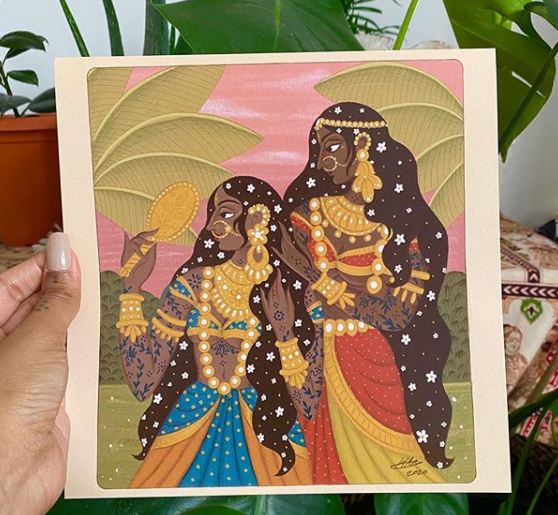
I thought that in order for me to get a job in this industry I had to whitewash myself into very Eurocentric drawings in order to fit in. So I did a lot of neo-traditional work, but I still gave things a sort of Indian-y flair because that’s what I’ve always been drawn to. It’s interesting cause I feel like my work hasn’t really changed but then when I look at it, there’s new things.
When I moved back to Leicester, obviously there’s a huge asian population. Embracing the Indian side of my work would be liked here – people would like it more. Funnily enough I don’t really have a lot of clients from Leicester. Most of my clients travel from different parts of the country, which is amazing. Obviously it’s mad cause no one knows there is a little brown girl in Leicester that does tattoos, when I meet people they can’t believe it.
No two skin tones or skin types are the same
I think if you are a colour work artist, it is important that you figure out how to adapt your colour palette to other people’s skin tones. Something I saw a lot from my questioning and the POC experience of getting tattooed, a lot of people got turned down or were told colour wouldn’t work.
I’ve seen colour tattoos on black and brown people, and they look amazing, they’re gorgeous. They don’t look the same as they would on white people, that’s not the point and it doesn’t need to look the same. It’s beautiful in its own right.
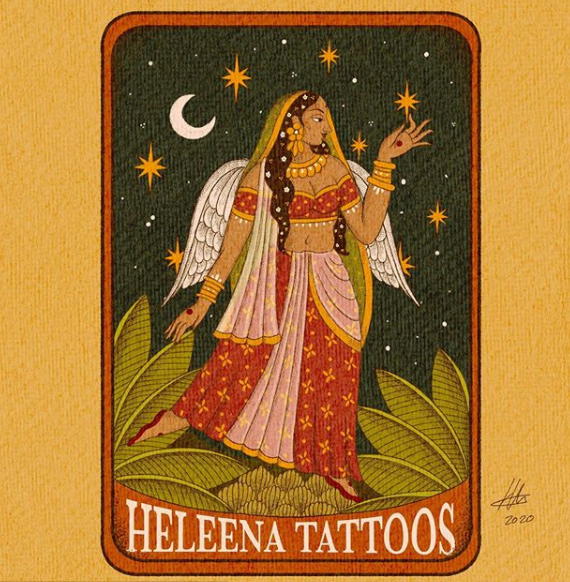
No two skin tones or skin types are the same. You have to be able to adapt no matter what. Cause you don’t know what the person’s skin is going to be like if you’ve never tattooed them before. Everyone’s skin is different, so I don’t understand why if your skin is visibily different people would refuse to tattoo you – that’s a huge issue.
I’m guilty of it too, I used to tell people that I didn’t do colour because I didn’t know how it was going to work on POC. I didn’t think it would work because during apprenticeships, that’s what anybody is told – tattoo a POC and the colour turns out like this, the tattoo does this and this. Then you believe it, but seeing other artists be like no it actually does work. I feel like an idiot, why did I just take somebody’s else word for it instead of learning about it and implementing it in my own art work?
By colouring a different coloured piece of paper or just turn the screen brown on your iPad, then add the colour to find what colours work. I see a lot of tattoo artists do that as well with their flash sheets, instead of having it just on white paper they use brown paper. That’s so cool, they’re so smart! Obviously tattoos won’t look like how they do on pen and paper but you get the gist. The contrast more than anything seems to be what everyone has the issue with. The lighter you are the more contrast black has one white, the darker you are the less contrast, it doesn’t mean that you can’t see it – it’s not invisible.
The patch test thing has been controversial too, because if you wouldn’t do a patch test on a white person, why would you do it on a black person? It kinda make sense but I guess we’re not at the stage yet where we know enough about doing colour tattoos on POC. We need to build that skill set and can look at a POC and know exactly what colours will work with their skin. Since we’re not at that stage the best way to do it is to just put pretty little coloured dots on people, obviously it’s not going to look terrible but it’s like a little rainbow. I think the patch test should be a free service though, I don’t think you should be paying for it. It’s not your fault that you need a patch test, it’s that artist’s lack of experience.
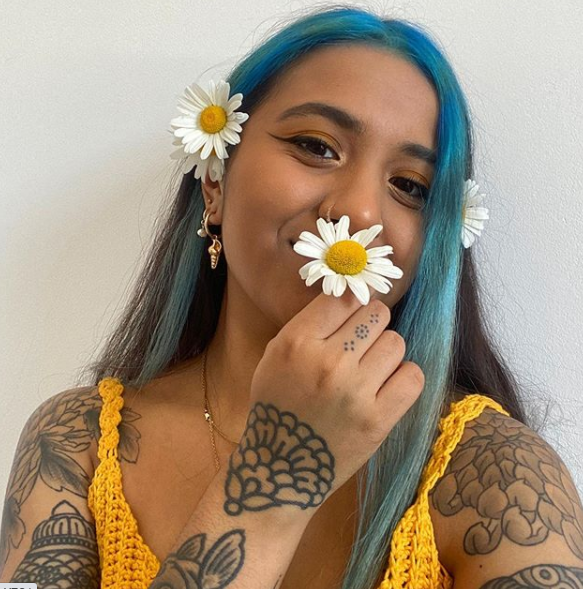
One last thing I would like to say to anyone who reads this, stop getting Buddha heads tattooed. It’s very offensive. In Thailand they have signs everywhere saying do not get a Buddha tattooed on you. I don’t know the ins and outs of it but the fact they have to have signs up telling people to stop getting them tattooed on you kind of says it all, doesn’t it? So now whenever I see a Buddha tattoo I’m like NO. You don’t understand, if you really knew about Buddha you wouldn’t have got that tattoo. If you really cared that much about Buddhism you would have known it offends them – so shame on you.
Heleena is continuing to speak out and challenge the tattoo industry, make sure to follow her Instagram and why not join in the conversation yourself?
One Reply to “Heleena on cultural appropriation in tattooing”